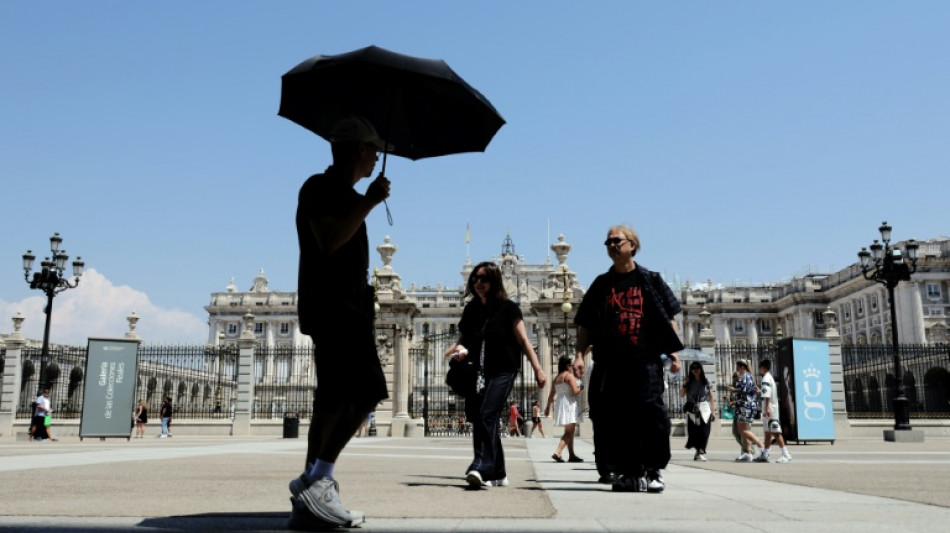
-
 Heart attack ends iconic French prop Atonio's career
Heart attack ends iconic French prop Atonio's career
-
SKorean chip giant SK hynix posts record operating profit for 2025

-
 Greenland's elite dogsled unit patrols desolate, icy Arctic
Greenland's elite dogsled unit patrols desolate, icy Arctic
-
Dutch tech giant ASML posts bumper profits, cuts jobs

-
 Musetti rues 'really painful' retirement after schooling Djokovic
Musetti rues 'really painful' retirement after schooling Djokovic
-
Russian volcano puts on display in latest eruption

-
 Thailand uses contraceptive vaccine to limit wild elephant births
Thailand uses contraceptive vaccine to limit wild elephant births
-
Djokovic gets lucky to join Pegula, Rybakina in Melbourne semi-finals

-
 Trump says to 'de-escalate' Minneapolis, as aide questions agents' 'protocol'
Trump says to 'de-escalate' Minneapolis, as aide questions agents' 'protocol'
-
'Extremely lucky' Djokovic into Melbourne semi-finals as Musetti retires

-
 'Animals in a zoo': Players back Gauff call for more privacy
'Animals in a zoo': Players back Gauff call for more privacy
-
Starmer heads to China to defend 'pragmatic' partnership

-
 Uganda's Quidditch players with global dreams
Uganda's Quidditch players with global dreams
-
'Hard to survive': Kyiv's elderly shiver after Russian attacks on power and heat

-
 South Korea's ex-first lady jailed for 20 months for taking bribes
South Korea's ex-first lady jailed for 20 months for taking bribes
-
Polish migrants return home to a changed country

-
 Dutch tech giant ASML posts bumper profits, eyes bright AI future
Dutch tech giant ASML posts bumper profits, eyes bright AI future
-
South Korea's ex-first lady jailed for 20 months for corruption

-
 Minnesota congresswoman unbowed after attacked with liquid
Minnesota congresswoman unbowed after attacked with liquid
-
Backlash as Australia kills dingoes after backpacker death

-
 Brazil declares acai a national fruit to ward off 'biopiracy'
Brazil declares acai a national fruit to ward off 'biopiracy'
-
Anisimova 'loses her mind' after Melbourne quarter-final exit

-
 Home hope Goggia on medal mission at Milan-Cortina Winter Olympics
Home hope Goggia on medal mission at Milan-Cortina Winter Olympics
-
Omar attacked in Minneapolis after Trump vows to 'de-escalate'

-
 Pistons escape Nuggets rally, Thunder roll Pelicans
Pistons escape Nuggets rally, Thunder roll Pelicans
-
Dominant Pegula sets up Australian Open semi-final against Rybakina

-
 'Animals in a zoo': Swiatek backs Gauff call for more privacy
'Animals in a zoo': Swiatek backs Gauff call for more privacy
-
Japan PM's tax giveaway roils markets and worries voters

-
 Amid Ukraine war fallout, fearful Chechen women seek escape route
Amid Ukraine war fallout, fearful Chechen women seek escape route
-
Rybakina surges into Melbourne semis as Djokovic takes centre stage

-
 Dollar struggles to recover from losses after Trump comments
Dollar struggles to recover from losses after Trump comments
-
Greenland blues to Delhi red carpet: EU finds solace in India

-
 Will the EU ban social media for children in 2026?
Will the EU ban social media for children in 2026?
-
Netherlands faces 'test case' climate verdict over Caribbean island

-
 Rybakina stuns Swiatek to reach Australian Open semi-finals
Rybakina stuns Swiatek to reach Australian Open semi-finals
-
US ouster of Maduro nightmare scenario for Kim: N. Korean ex-diplomat

-
 Svitolina credits mental health break for reaching Melbourne semis
Svitolina credits mental health break for reaching Melbourne semis
-
Japan's Olympic ice icons inspire new skating generation

-
 Safe nowhere: massacre at Mexico football field sows despair
Safe nowhere: massacre at Mexico football field sows despair
-
North Korea to soon unveil 'next-stage' nuclear plans, Kim says

-
 French ex-senator found guilty of drugging lawmaker
French ex-senator found guilty of drugging lawmaker
-
US Fed set to pause rate cuts as it defies Trump pressure

-
 Sleeping with one eye open: Venezuelans reel from US strikes
Sleeping with one eye open: Venezuelans reel from US strikes
-
Venezuela's acting president says US unfreezing sanctioned funds

-
 KPop Demon Hunters star to open Women's Asian Cup
KPop Demon Hunters star to open Women's Asian Cup
-
Trump warns of 'bad things' if Republicans lose midterms

-
 Russian strikes in Ukraine kill 12, target passenger train
Russian strikes in Ukraine kill 12, target passenger train
-
With Maduro gone, Venezuelan opposition figure gets back to work

-
 Celebrities call for action against US immigration raids
Celebrities call for action against US immigration raids
-
Rubio to warn Venezuela leader of Maduro's fate if defiant


Climate change made European heatwave up to 4C hotter: study
Human-caused climate change made recent European heatwaves up to 4C hotter in many cities, scientists said on Wednesday, pushing temperatures into deadly territory for thousands of vulnerable people.
This likely led to far more heat-related deaths than would have occurred without the influence of global warming, concluded a rapid study of the episode by over a dozen researchers from five European institutions.
Temperatures between late June and early July soared well above 40 degrees Celsius (104F) in many European countries as the first heatwave of the summer broke records and triggered health warnings.
The EU's climate monitor Copernicus on Wednesday said it was the hottest June on record in western Europe, where some schools and tourist sites were shuttered as the mercury soared.
To assess what role climate change played, scientists compared how intense a heatwave would have been in a world that had not warmed due to burning masses of fossil fuels.
Using historical weather data, they concluded the heatwave "would have been 2-4C cooler" without human-induced climate change in all but one of the 12 cities studied.
The added degrees greatly elevated the risk in these cities, which have a combined population of more than 30 million and include major capitals Paris, London and Madrid.
"What that does is it brings certain groups of people into more dangerous territory," said researcher Ben Clarke from Imperial College London, which co-led the study with the London School of Hygiene and Tropical Medicine.
"For some people it's still warm, fine weather. But for now a huge sector of the population, it's more dangerous," he told reporters.
- Life and death -
The study, for the first time, also sought to estimate the death toll from the heatwave in the 12 cities studied, and how many could be attributed to climate change.
Based on peer-reviewed scientific methods and established research on heat and mortality, the study concluded the heatwave likely caused about 2,300 deaths between June 23 and July 2 across the 12 cities studied.
But about 1,500, or roughly two thirds, of all these deaths would not have occurred had climate change not pushed temperatures to such dangerous highs, researchers said.
The authors -- from research institutions in the UK, Netherlands, Denmark and Switzerland -- stressed this estimate was just a snapshot of the wider heatwave, as no official count was yet available.
Heatwaves are particularly dangerous for the elderly, the sick, young children, outdoor workers, and anyone exposed to high temperatures for prolonged periods without relief.
The effect on health is compounded in cities, where heat is absorbed by paved surfaces and buildings, making urban areas much hotter than their surroundings.
Copernicus said large parts of southern Europe experienced so-called "tropical nights" during the heatwave, when overnight temperatures don't fall low enough to let the body recover.
"An increase in heatwave temperature of just two or four degrees can mean the difference between life and death for thousands of people," said Garyfallos Konstantinoudis, a lecturer at Imperial College London.
"This is why heatwaves are known as silent killers. Most heat-related deaths occur in homes and hospitals out of public view and are rarely reported," he told reporters.
Authorities say it could take weeks to tally a more definitive death toll from the recent heatwave, but similar episodes have claimed tens of thousands of lives in Europe during previous summers.
H.Kuenzler--VB



